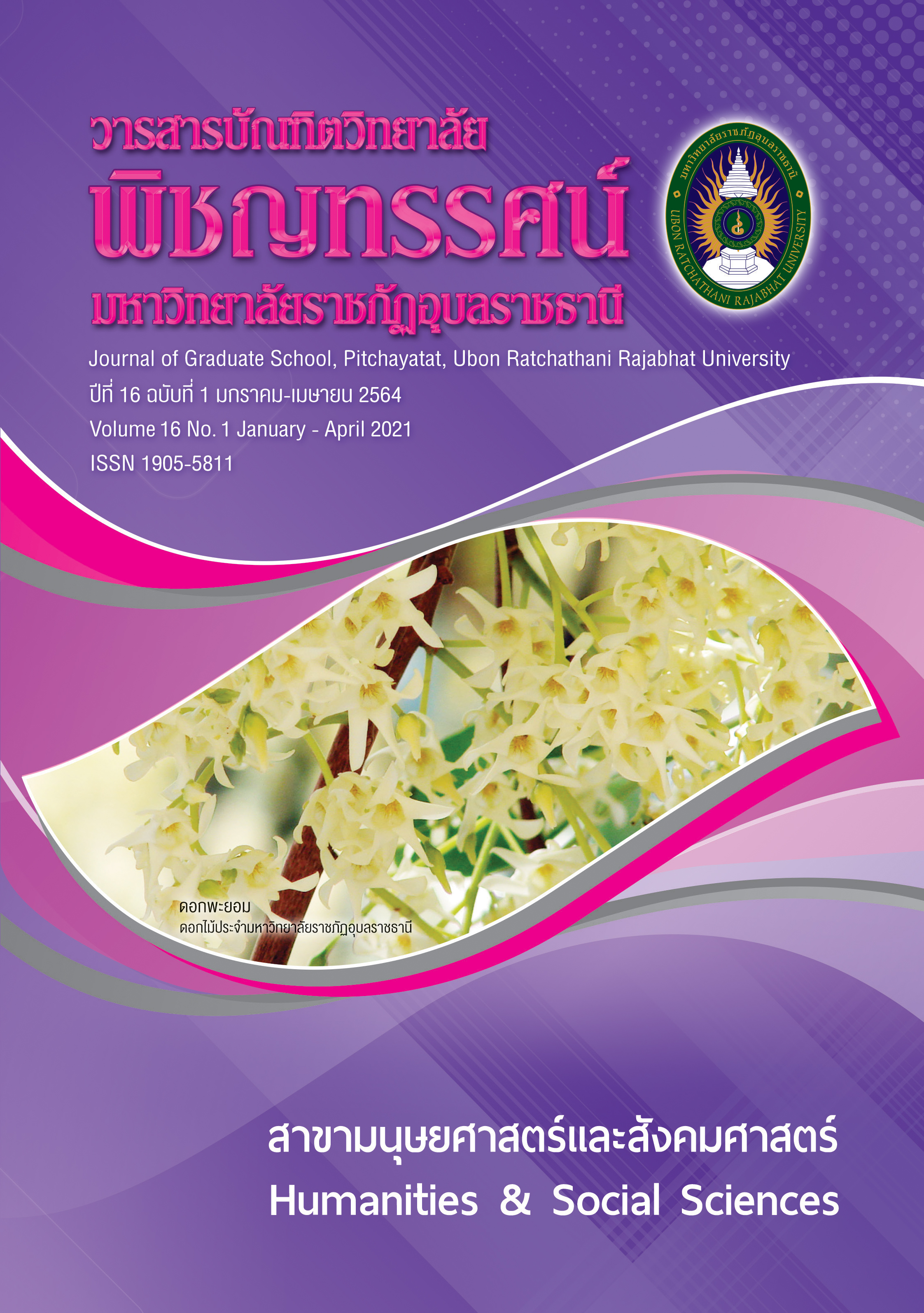อิทธิพลของสมรรถนะทางวิชาชีพที่มีต่อความสำเร็จในการปฏิบัติงานในหน้าที่ ของหัวหน้าแผนกครัว(เชพ)
คำสำคัญ:
สมรรถนะทางวิชาชีพ, หน้าที่ในการปฏิบัติงาน, หัวหน้าพ่อครัวบทคัดย่อ
การวิจัยนี้มีวัตถุประสงค์เพื่อ 1) ศึกษาระดับสมรรถนะและระดับความสำเร็จในการปฏิบัติงานตามหน้าที่ของหัวหน้าแผนกครัวในธุรกิจอาหารของอุตสาหกรรมโรงแรมและการท่องเที่ยว 2) ศึกษาอิทธิพลของสมรรถนะที่มีต่อความสำเร็จในการปฏิบัติงานตามหน้าที่ของหัวหน้าแผนกครัวในธุรกิจอาหารของอุตสาหกรรมโรงแรมและการท่องเที่ยว ตัวอย่าง คือ บุคลากรที่ทำหน้าที่หัวหน้าแผนกครัว ในธุรกิจอาหารของอุตสาหกรรมโรงแรมและการท่องเที่ยว จำนวน 120 คน ได้มาโดยวิธีการสุ่มตัวอย่างอย่างง่าย เครื่องมือที่ใช้ในการวิจัย คือ แบบสอบถามแบบมาตราส่วนประมาณค่า 5 ระดับ สถิติที่ใช้ ได้แก่ ความถี่ ร้อยละ ค่าเฉลี่ยเลขคณิต การวิเคราะห์สหสัมพันธ์ และการวิเคราะห์การถดถอยพหุคูณ
ผลการวิจัยพบว่า
- หัวหน้าพ่อครัวมีผลการปฏิบัติหน้าที่โดยภาพรวมอยู่ในระดับดีมากด้วยค่าเฉลี่ย 4.58 มีสมรรถนะทางวิชาชีพโดยภาพรวมอยู่ในระดับมากที่สุดด้วยค่าเฉลี่ย 4.59 โดยสมรรถนะที่มีค่าเฉลี่ยสูงที่สุด คือ สมรรถนะด้านความรู้ด้วยค่าเฉลี่ย 4.63 รองลงมาคือ สมรรถนะด้านสัมพันธภาพ และ สมรรถนะด้านคุณลักษณะส่วนบุคคล ด้วยค่าเฉลี่ย 4.62 และ 4.59 ตามลำดับ
- สมรรถนะทั้ง 7 ด้าน ได้แก่ ด้านความรู้ ด้านทักษะ ด้านการใฝ่สัมฤทธิ์ในงาน ด้านสัมพันธภาพ ด้านคุณลักษณะส่วนบุคคล ด้านการจัดการ และด้านภาวะผู้นำ สามารถร่วมกันอธิบายความแปรปรวนของความสำเร็จในการปฏิบัติงานตามหน้าที่ได้ ร้อยละ 30.2 โดยมีสองสมรรถนะที่มีอิทธิพลเชิงบวกอย่างมีนัยสำคัญทางสถิติที่ระดับนัยสำคัญ .01 ต่อความสำเร็จในการปฏิบัติงานตามหน้าที่ คือ สมรรถนะด้านคุณลักษณะส่วนบุคคล และ สมรรถนะด้านความรู้
เอกสารอ้างอิง
จำลอง นักฟ้อน. หน่วยที่ 9 การบริหารสมรรถนะทรัพยากรในองค์กรมหาวิทยาลัยสุโขทัยธรรมาธิราช. (ออนไลน์) 2560 (อ้างเมื่อ 1 เมษายน 2563). จาก http://edu2.stou.ac.th/wp-content/uploads/23720-9.pdf
จิรประภา อัครบวร. “Competency คืออะไรกันแน่,” ดำรงราชานุภาพ. 6, 20 (2549): 1-3.
จิราพร ทัศพินิจ และคณะ. “การวิเคราะห์สมรรถนะอาชีพของพ่อครัวในโรงแรม,” การอาชีวะและเทคนิคศึกษา. 2, 4 (2555): 50-58.
ธนิษฐา ชีวพัฒนพันธุ์. “สมรรถนะของพนักงานบัญชีในโรงงานอุตสาหกรรมในพื้นที่จังหวัดนนทบุรี ตามทัศนะของ หัวหน้างานบัญชี,” RMUTT Global Business and Economics Review. 10, 2 (2558): 141- 152.
ธันยนันท์ ทองปานคุณานนท์. สมรรถนะในการปฏิบัติงานของพนักงาน กรณีศึกษาบริษัท โพสโค (ไทยแลนด์) จำกัด. สารนิพนธ์ศิลปศาสตรมหาบัณฑิต มหาวิทยาลัยเกริก, 2557.
ปิยชัย จันทรวงศ์ไพศาล. การค้นหาและวิเคราะห์เจาะลึก Competency ภาคปฏิบัติ. พิมพ์ครั้งที่ 2. กรุงเทพฯ:บริษัท H.R. Center, 2549.
วิจัยกสิกรไทย, ศูนย์. แนวโน้มธุรกิจอาหาร. (ออนไลน์) 2562 (อ้างเมื่อ 14 มีนาคม 2563). จาก https://kasikornresearch.com/th/analysis/k-econ/business?c=361. 2562.
สุกัญญา รัศมีธรรมโชติ. แนวทางการพัฒนาทรัพยากรมนุษย์ด้วย Competency-Based Learning. พิมพ์ครั้งที่ 5. กรุงเทพฯ: ศิริวัฒนา อินเตอร์พริ้นท์, 2550.
Boam, R. and P. Sparrow. PDesigning andAchieving Competency: A Competency Based Based Approach to Developing People and Organization. London: McGraw-Hill Book Company, 1992.
Dobois, D. David d. et al. Competency-based Human Resources Management. Boston: Davies-Black Publishing, 2004.
Nunnally, J. C. Psychometric theory (2nd ed.). New York: McGraw-Hill, 1978.
Porter, Michael E. Competitive Strategy: Techniques for Analyzing Industries and Competitors. New York: The Free Press, 1980.
Shermon, G. Competency based HRM: A Strategic resource for competency mapping Assessment and development Centre. New Delhi: Tata McGraw-Hill, 2004.
Zwell, M. Creating a Culture of Competence. New York: John Wiley and Sons, 2000.
ดาวน์โหลด
เผยแพร่แล้ว
รูปแบบการอ้างอิง
ฉบับ
ประเภทบทความ
สัญญาอนุญาต
บทความทุกเรื่องได้รับการตรวจความถูกต้องทางวิชาการโดยผู้ทรงคุณวุฒิภายนอกอย่างน้อย 3 คน ความคิดเห็นในวารสารพิชญทรรศน์เป็นความคิดเห็นของผู้นิพนธ์มิใช่ความคิดเห็นของผู้จัดทำ จึงมิใช่ความรับผิดชอบของวารสารพิชญทรรศน์ และบทความในวารสารพิชญทรรศน์สงวนสิทธิ์ตามกฎหมายไทย การจะนำไปเผยแพร่ต้องได้รับอนุญาตเป็นลายลักษณ์อักษรจากกองบรรณาธิการ





